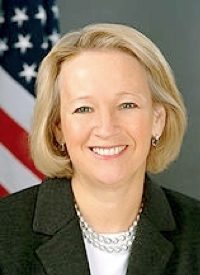
The Securities and Exchange Commission is once again under fire for ethics charges. Just two years ago, the agency was implicated for its failure to detect Bernard L. Madoff’s Ponzi scheme. Now, it’s SEC Chairwoman Mary Schapiro (pictured) who is under Congressional scrutiny for hiring David M. Becker — a man with financial connections to Bernie Madoff’s Ponzi scheme — as SEC’s general counsel.
The New York Times reports:
The revelations about Mr. Becker’s role have raised fresh questions about ethical standards and practices as the agency, where Mary L. Schapiro was brought in as chairwoman two years ago with a mandate to strengthen its enforcement unit…Questions about Mr. Becker arose last month after Irving H. Picard, the trustee overseeing the Madoff case, sued him and two of his brothers to recover $1.5 million of the $2 million they had inherited in 2004 from a Madoff investment by their late mother. Mr. Becker’s financial ties to Madoff had not been publicly disclosed until that suit.
SEC inspector general, H. David Kotz, announced last Friday that he would be investigating the potential conflicts of interest related to Becker’s role as both Madoff’s recipient, SEC general counsel, and senior policy director of decisions related to Madoff’s Ponzi scheme. It was allegedly Ms. Schapiro who requested the review from the inspector general.
Not surprisingly, Becker’s conflict of interests is apparent when one considers his recommendation to change the way the agency reimbursed investors of the Madoff accounts. The SEC’s stance on the subject was that investors should simply be reimbursed the amount that they invested, but Becker suggested that victims be allowed to also keep the investors’ gains, a recommendation that would have also benefited the Becker family, as Becker’s late mother’s $500,000 investment in Madoff’s company made a gain of $1.54 million.
Becker claims that he was forthcoming with Ms. Schapiro and the chief ethics officer of his financial affiliations with the Madoff investment account, “either shortly before or after” joining the SEC in February 2009. He also indicates that he alerted the ethics office of his family’s investment in Madoff’s scheme in May after he received a letter from the law firms representing Madoff victims that requested the SEC change its compensation arrangement for the victims.
“I recognized that it was conceivable that this issue could affect my financial interests because the issue could affect the trustee’s decision to bring clawbacks against persons like me,” wrote Becker in response to lawmakers. Becker indicates that the ethics officer approved of his participation.
Of Becker’s interactions with the ethics officer, the New York Times reports, “That [ethics] officer reported directly to Mr. Becker and spent only 25 minutes reviewing the matter, according to Congressional staff members briefed on the discussions who requested anonymity because they also were not authorized to discuss the matter publicly.”
At issue is whether or not Becker and Schapiro followed the guidelines to ensure that they were operating under government ethics rules. That includes a written statement prepared by Schapiro which proves that she thoroughly reviewed Becker’s financial interest in the matter and determined without issue that Becker’s interest was not substantial enough to impact his discretion.
Schapiro will also have to explain whether she discussed Becker’s interest in the Madoff account with other staff members and whether she took up the issue with the Office of Government Ethics, or, at the very least, the SEC’s ethics counsel.
A March 1 letter signed by Republican members of the House Financial Services Committee — Spencer Bacchus, Jeb Hensarling, Scott Garrett, and Randy Neugebauer — asks, “As the government official responsible for appointing Mr. Becker to his position in 2009, what steps did you take to manage the appearance of or actual conflict of interest presented by Mr. Becker’s financial interest in the Securities Investor Protection Corporation’ liquidation?”
Schapiro will appear before the United States Congress on Thursday to discuss whether she followed the government ethics rules.
Schapiro has already missed one deadline, set for Monday, in which she was supposed to respond to questions regarding her discussions with Becker at the time he was hired related to his Madoff account. As of Tuesday, Schapiro declined to comment.
Remarking on the investigation is Representative Randy Neugebauer, (R-Texas), who said, “One of the things the S.E.C. does is hold companies to a very high standard with regards to transparency and disclosure. We think it’s important that the same integrity exists within the SEC, ensuring that people working there do not have conflicts of interest and that here is a process to vet those issues and make sure they are taken care of in a way that gives confidence.”
Unfortunately, Neugebauer’s remarks seem to ignore the secrecy that has characterized the SEC in recent years.
For example, the SEC was discovered to have worked alongside AIG to keep its bailout sealed, and granted “confidential treatment” as well as a “secrecy order” to the company. Word Press reported on the matter:
In May, the SEC approved a request by AIG to keep secret an exhibit to a year-old regulatory filing that includes some of the details on the most controversial part of the AIG bailout: the funneling of tens of billions of dollars to big banks like Societe Generale, Goldman Sachs, Deutsche Bank, and Merrill Lynch.
The SEC’s Division of Corporation Finance, in granting AIG’s request for confidential treatment, said the “excluded information” will not be made public until November 25, 2018, according to a copy of the agency’s May 22 order.
Likewise, the SEC managed to exempt itself from the Freedom of Information Act last year. Proving once more that transparency is not a top priority for the agency.




